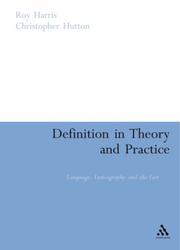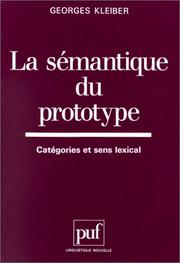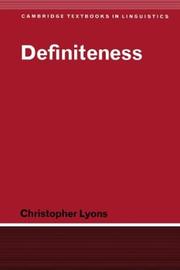| Listing 1 - 7 of 7 |
Sort by
|
Book
Year: 1986 Publisher: [S.l.] : [chez l'auteur],
Abstract | Keywords | Export | Availability | Bookmark
 Loading...
Loading...Choose an application
- Reference Manager
- EndNote
- RefWorks (Direct export to RefWorks)
Phrase nominale. --- Définition (linguistique) --- Sémantique (philosophie)
Book
ISBN: 2738108075 9782738108074 Year: 2000 Volume: 1 Publisher: Paris: Odile Jacob,
Abstract | Keywords | Export | Availability | Bookmark
 Loading...
Loading...Choose an application
- Reference Manager
- EndNote
- RefWorks (Direct export to RefWorks)
Onomasiology --- Définition (linguistique). --- Chimie --- Mathématiques --- Biologie --- Dénomination. --- Sciences --- Droit --- Lexicologie. --- Terminologie. --- connaissance --- dénomination --- Dénominations. --- science --- Connaissance --- Dénomination
Book
ISBN: 9782705683535 Year: 2012 Publisher: Paris : Hermann,
Abstract | Keywords | Export | Availability | Bookmark
 Loading...
Loading...Choose an application
- Reference Manager
- EndNote
- RefWorks (Direct export to RefWorks)
Cet essai étudie dʹun point de vue linguistique, historique et sémantique, les définitions des dictionnaires. En effet, elles sont le reflet dʹune démarche intellectuelle et d'une conception particulière de la langue.

ISBN: 9780826497055 0826497055 Year: 2007 Publisher: London ; New York : Bloomsbury,
Abstract | Keywords | Export | Availability | Bookmark
 Loading...
Loading...Choose an application
- Reference Manager
- EndNote
- RefWorks (Direct export to RefWorks)
The problem of definition has a long history and has engaged the minds of some of the most eminent thinkers in the Western tradition, from Plato and Aristotle onwards. But it is also an everyday problem constantly confronting all who have to draft or interpret the countless texts on which modern society depends. Definition in Theory and Practice focuses on two areas where difficulties arise in a particularly acute form: lexicography and the law. Examining a wide range of approaches and definitional techniques, backed up by detailed analyses of dictionary entries and court cases, the authors provide a comprehensive survey of their subject. They argue that what underlies the problem of definition are conflicting assumptions about the way language functions. This in-depth study of definition will be of interest to academics researching lexicography, semantics and the intersection of linguistics and jurisprudence.
Definition (Philosophy) --- Law --- Lexicography --- Reference (Philosophy) --- Semantics --- Formal semantics --- Semasiology --- Semiology (Semantics) --- Comparative linguistics --- Information theory --- Language and languages --- Lexicology --- Meaning (Psychology) --- Referring, Theory of --- Theory of referring --- Philosophy --- Encyclopedias and dictionaries --- Language, Legal --- Legal language --- Legal style --- Style, Legal --- Bill drafting --- Definability --- Definition (Logic) --- Undefinability --- Semantics (Philosophy) --- Language --- Définition (linguistique) --- Définition (philosophie) --- Référence (philosophie) --- Sémantique juridique --- Langage juridique --- Lexicographie. --- Sémantique juridique.
Book
ISBN: 9782912589569 Year: 2018 Publisher: Clermont-Ferrand : [Issy-les-Moulineaux]] : Centre Michel de l'Hospital, Lextenso-LGDJ.
Abstract | Keywords | Export | Availability | Bookmark
 Loading...
Loading...Choose an application
- Reference Manager
- EndNote
- RefWorks (Direct export to RefWorks)
La 4e de couverture indique : "C'est en 2014 qu'un cycle de manifestations consacrées aux artifices du droit a été initié à Clermont-Ferrand. La première d'entre elles, dédiée aux fictions, a donné lieu à une publication dont l'objectif était de rappeler l'importance du procédé fictif pour les juristes (A.-B. Caire, les fictions en droit. Les artifices du droit : les fictions, Ed. du Centre Michel de l'Hospital - LGDJ, 2015). Par la suite, une deuxième manifestation, relative aux définitions, a eu lieu le 7 juin 2017 dans le but de prolonger l'étude ainsi entamée des artifices du droit, entendus comme les moyens habiles ou ingénieux de connaître le droit ou d'émettre du droit. En effet, il appert que la place de la définition dans le champ juridique est centrale. Nombreuses sont les questions qui se posent à cet égard. Le droit doit-il contenir les définitions, malgré les solennels avertissements du jurisconsulte Javolenus au 1er siècle apr. J.-C. selon lequel toute définition est périlleuse en droit ? Autrement dit, la définition est-elle nécessaire ou superflue ? Le droit lui-même peut-il défini ? A trop vouloir définir, le juriste ne s'expose-t-il pas à tomber dans certains pièges ? Quel est l'impact des définitions sur la légistique et sur la justice ? Quelles sont les conséquences de la disparition de certaines définitions classiques au gré des réformes ? Pour tenter de répondre à ces interrogations, cet ouvrage consacré aux artifices du droit se penche donc sur la problématique essentielle de la définition en droit. Ce thème est plus précisément abordé dans les diverses branches du droit (droit privé, droit public, droit européen, droit étranger). En outre, une approche à la fois historique et philosophique vient compléter ce tableau comparatiste pour tenter de mieux cerner la place de la définition dans notre système juridique."
Définition (philosophie) --- Définition (linguistique) --- Langage juridique --- Rédaction législative --- Logique juridique --- Droit --- Philosophie --- Langage juridique. --- Rédaction législative. --- Logique juridique. --- Droit. --- Philosophie. --- Definition (Philosophy) --- Law --- Droit langage --- Bill drafting --- Projets de loi --- Law and legislation. --- Language --- Rédaction --- Philosophy --- Comparative law --- Droit comparé --- Définition (philosophie) --- Définition (linguistique) --- Rédaction législative.

ISBN: 2130428371 9782130428374 Year: 1990 Publisher: Paris: PUF,
Abstract | Keywords | Export | Availability | Bookmark
 Loading...
Loading...Choose an application
- Reference Manager
- EndNote
- RefWorks (Direct export to RefWorks)
Lexicology. Semantics --- Définition (linguistique) --- Signification (linguistique) --- Catégorisation (psychologie) --- Sémantique --- Semantics --- Categorization (Linguistics) --- Catégorisation (Linguistique) --- 804.0-56 --- Classification (Linguistics) --- Linguistic analysis (Linguistics) --- Formal semantics --- Semasiology --- Semiology (Semantics) --- Comparative linguistics --- Information theory --- Language and languages --- Lexicology --- Meaning (Psychology) --- Frans: syntaxis; semantiek --- Semantics. --- 804.0-56 Frans: syntaxis; semantiek --- Categorization (Linguistics). --- Définition (linguistique) --- Catégorisation (psychologie) --- Sémantique --- Catégorisation (Linguistique) --- LINGUISTIQUE --- SEMANTIQUE --- SEMANTIQUE DU PROTOTYPE

ISBN: 1107111552 0511009984 1280416556 0511172362 0511150881 0511310374 0511605781 051105243X 9780511009983 051103721X 9780511037214 9780511150883 9780521362825 0521362822 9780511605789 9786610416554 6610416559 0521368359 9780521368353 9781107111554 9781280416552 9780511172366 9780511310379 Year: 1999 Publisher: Cambridge: Cambridge university press,
Abstract | Keywords | Export | Availability | Bookmark
 Loading...
Loading...Choose an application
- Reference Manager
- EndNote
- RefWorks (Direct export to RefWorks)
This 1999 textbook investigates definiteness both from a comparative and a theoretical point of view, showing how languages express definiteness and what definiteness is. It surveys a large number of languages to discover the range of variation in relation to definiteness and related grammatical phenomena, such as demonstratives, possessives and personal pronouns. It outlines work done on the nature of definiteness in semantics, pragmatics and syntax, and develops an account on which definiteness is a grammatical category represented in syntax as a functional head (the widely discussed D). Consideration is also given to the origins and evolution of definite articles in the light of the comparative and theoretical findings. Among the claims advanced are that definiteness does not occur in all languages, though the pragmatic concept which it grammaticalizes probably does.
Definiteness (Linguistics) --- Grammar, Comparative and general --- Semantics. --- Pragmatics. --- Pragmalinguistics --- General semantics --- Language and languages --- Logic, Symbolic and mathematical --- Semantics (Philosophy) --- Formal semantics --- Semasiology --- Semiology (Semantics) --- Comparative linguistics --- Information theory --- Lexicology --- Meaning (Psychology) --- Syntax --- Indefiniteness (Linguistics) --- Linguistics --- Syntax. --- Philosophy --- Determiners --- Définition (linguistique) --- Grammaire comparée --- Pragmatique --- Syntaxe. --- Pragmatics --- Semantics --- 801.56 --- Syntaxis. Semantiek --- 801.56 Syntaxis. Semantiek --- Definiteness (Linguistics). --- Arts and Humanities --- Language & Linguistics --- Grammar [Comparative and general ] --- Philology --- Grammar, Comparative and general - Syntax. --- Grammar, Comparative and general - Syntax --- Grammar, Comparative and general Syntax
| Listing 1 - 7 of 7 |
Sort by
|

 Search
Search Feedback
Feedback About UniCat
About UniCat  Help
Help News
News